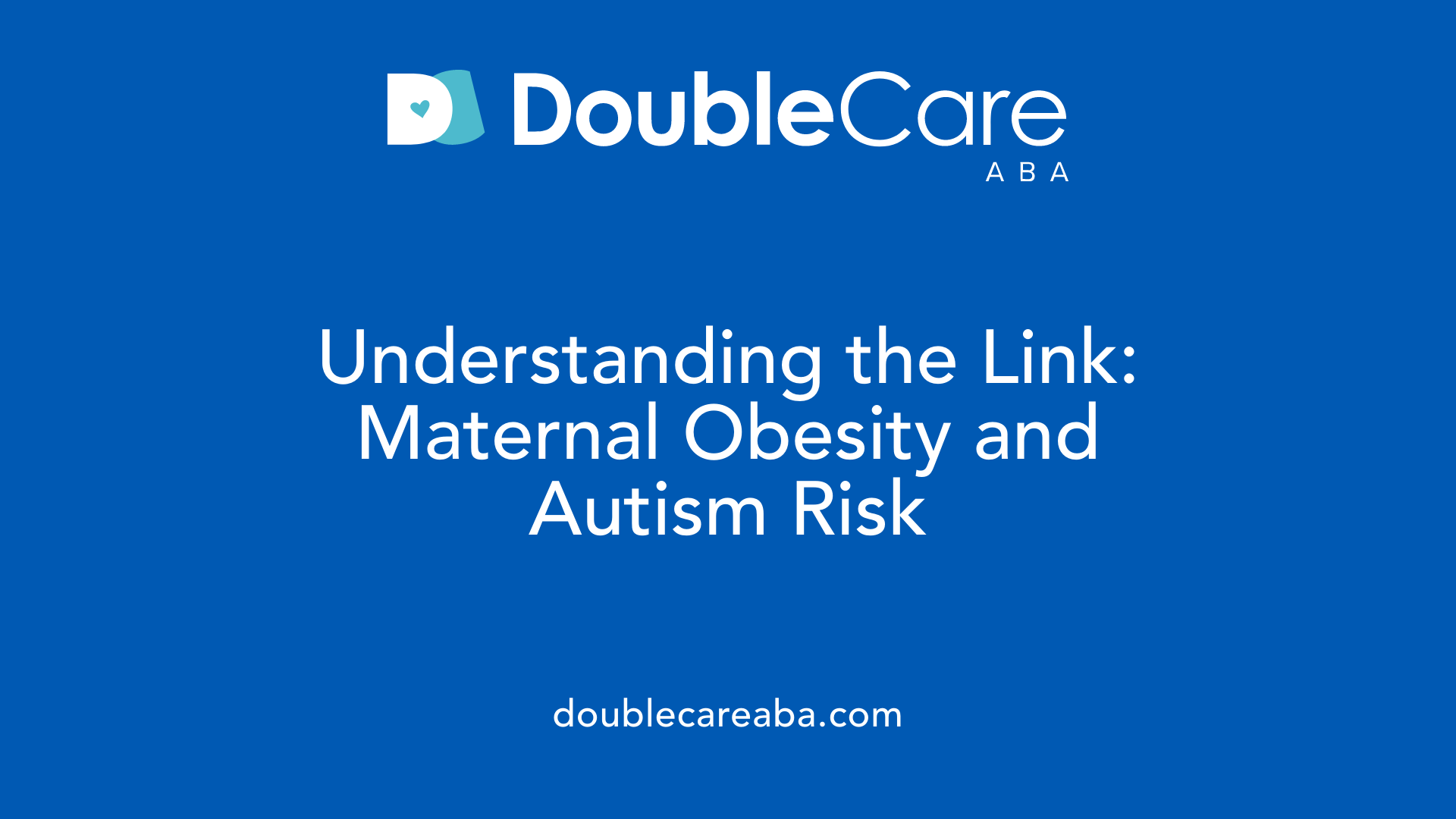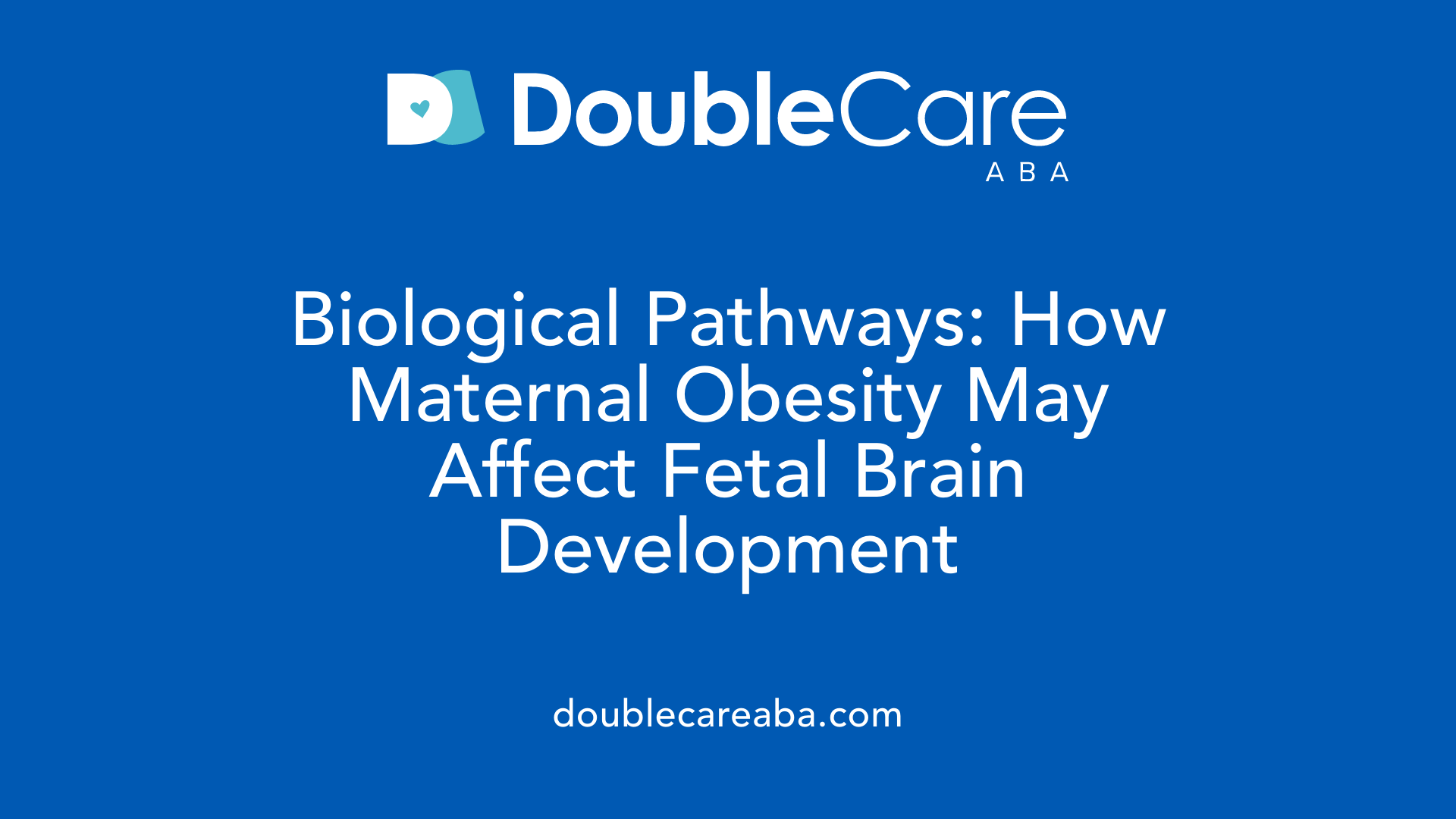Understanding the Emerging Evidence
Recent scientific research underscores a significant association between maternal obesity and the increased risk of autism spectrum disorder (ASD) in offspring. This complex relationship involves multiple biological pathways and environmental factors, raising critical questions about causality, mechanisms, and preventive strategies. This article explores current findings, biological insights, and the broader context of maternal health's influence on neurodevelopmental outcomes.
Epidemiological Evidence Linking Maternal Obesity to Autism Risk

What is the prevalence of obesity among children with autism?
Obesity among children with autism spectrum disorder (ASD) is a marked concern. Studies estimate that between 11% and 40% of children with ASD are obese, with the average around 17%. This prevalence is notably higher compared to typically developing peers.
Research indicates that children with ASD are about 40 to 58% more likely to develop obesity. The rates tend to increase with age; for example, among older children aged 11–18, the obesity prevalence can reach approximately 30%, whereas younger children show rates closer to 15%.
Several factors contribute to this elevated risk, including medication use (such as antipsychotics), atypical eating patterns, sleep disturbances, and lower levels of physical activity. These findings highlight that obesity is a significant and growing health issue within the ASD community across various demographic groups.
Is birth weight associated with autism risk?
Research has also explored the relationship between birth weight and autism. Meta-analytical data consistently show that very low birth weight significantly increases the risk of developing ASD. Additionally, children with low birth weight overall—though not as extremely low—also face a heightened risk. This suggests that early developmental factors, including intrauterine growth restrictions, can influence neurodevelopmental outcomes.
What evidence exists linking maternal obesity to autism?
The connection between maternal obesity and autism risk is supported by several epidemiological investigations. Large cohort studies, such as those involving the Boston Birth Cohort and the Norwegian Mother and Child Cohort Study, have demonstrated that children born to obese mothers—especially when coupled with maternal conditions like diabetes or asthma—have a substantially increased likelihood of ASD diagnosis.
For instance, research has shown hazard ratios exceeding 3 when maternal obesity is combined with pregestational or gestational diabetes, indicating more than threefold increased risk.
Biologically, maternal obesity may promote inflammation, hormonal imbalances, and metabolic disturbances during pregnancy. These factors can contribute to epigenetic modifications, particularly in oocytes, affecting gene expression in fetal neurodevelopment.
Animal studies bolster these findings, revealing that offspring of obese mothers exhibit behavioral traits similar to autism and epigenetic changes in genes involved in brain development, such as Homer1. Examples include impaired social behaviors and repetitive activities in adolescent mouse models with maternal obesity.
Overall, the accumulating evidence suggests that maternal health—especially obesity and its related metabolic conditions—has a significant impact on the neurodevelopmental trajectory of children, influencing their susceptibility to autism.
Biological Pathways and Mechanisms

What are biological mechanisms explaining how maternal obesity may influence autism risk?
Understanding how maternal obesity impacts the risk of autism spectrum disorder (ASD) in offspring involves exploring complex biological processes. Maternal obesity leads to an environment characterized by inflammation, hormonal imbalance, and metabolic disturbances during pregnancy. Elevated levels of inflammatory cytokines such as IL-6 and IL-1β can cross the placental barrier, triggering immune activation and neuroinflammation in the developing fetus. This inflammatory response may interfere with normal brain development, affecting neural connectivity and synaptic formation.
In addition, obesity influences hormonal pathways, including insulin and serotonin signaling, which are crucial for fetal brain growth. Disruptions in these pathways due to metabolic dysregulation can contribute to neurodevelopmental alterations. The maternal gut microbiome, which is affected by obesity, also plays a role by increasing oxidative stress and inflammatory mediators.
Moreover, epigenetic modifications—heritable changes in gene expression without altering DNA sequences—are central mechanisms. Maternal obesity has been associated with changes in DNA methylation patterns in placental and fetal tissues. These modifications can regulate neurodevelopmental genes, such as Homer1, essential for synaptic function, potentially predisposing offspring to ASD.
Genetic and epigenetic inheritance further complicate this relationship. Paternal obesity and familial factors suggest that some effects may be inherited or influenced by shared genetic susceptibilities, adding an extra layer to understanding the intrauterine impact of maternal obesity.
What do scientific studies reveal about the biological mechanisms linking maternal obesity to autism?
Research into this area reveals that the impact of maternal obesity on ASD involves multiple intersecting biological pathways. Animal studies have shown that maternal obesity can cause lasting epigenetic changes, such as alterations in DNA methylation that affect neurodevelopmental genes. For instance, modifications in the methylation status of genes like Homer1 influence synaptic connectivity, a critical factor in ASD.
Furthermore, maternal obesity induces systemic inflammation, which can extend to the fetus via placental transfer, activating inflammatory immune responses in the developing brain. These neuroinflammatory processes can disrupt neural circuit formation, leading to behavioral phenotypes similar to ASD, particularly in males.
Epigenetic modifications may also result from the intrauterine environment shaped by excess adiposity, influencing gene expression patterns involved in neurodevelopment. Animal models have demonstrated that these epigenetic and inflammatory pathways can produce ASD-like behaviors, including social deficits and repetitive behaviors.
While epidemiological evidence supports a dose-response relationship between maternal BMI and ASD risk, confounding factors such as shared genetics and environment are also considered. The convergence of molecular, animal, and human studies underscores the multifaceted mechanisms by which maternal obesity may influence neurodevelopment and ASD risk.
Genetics, Environment, and Confounding Factors

How do genetic and environmental factors contribute to autism risk related to maternal obesity?
Both inherited genetics and environmental influences significantly impact autism spectrum disorder (ASD) risk, especially in the context of maternal obesity.
Genetic predispositions play a crucial role, as twin studies and familial analyses reveal that autism has a strong heritable component. Specific gene mutations, such as those affecting neurodevelopmental pathways, can be inherited and increase susceptibility.
Environmental factors, particularly those associated with maternal health, such as obesity, contribute by creating a metabolic environment that influences fetal brain development. Maternal obesity is linked to systemic inflammation, hormonal imbalances, and alterations in the microbiome, which can interfere with normal neurodevelopment.
Pregnancy-related exposures like maternal infections, immune activation, and exposure to environmental toxicants further complicate the picture. These exposures often lead to neuroinflammation and oxidative stress, processes known to impair fetal brain growth.
Shared familial genetics and environmental influences make it challenging to distinguish causal relationships. Many studies suggest that the observed association between maternal obesity and autism may partly be due to inherited genetic factors or shared environment rather than direct causation.
In sum, both genetics and environment interact intricately, influencing neurodevelopment and ASD risk.
Does maternal obesity directly cause autism, or are other factors involved?
Current research indicates that maternal obesity is associated with a modest increase in the likelihood of ASD in offspring. For example, children of obese mothers are more than twice as likely to be diagnosed with autism compared to children of mothers with healthy weight.
However, this association does not necessarily imply a direct cause-and-effect relationship. The presence of confounding factors, such as genetic predispositions, shared environment, and familial health conditions, complicates the interpretation.
Mechanistic hypotheses suggest that maternal obesity may create a pro-inflammatory and hyperglycemic environment during pregnancy, which could impact fetal brain development. Inflammation and metabolic disturbances might alter neurodevelopmental trajectories.
Nevertheless, many studies emphasize that maternal obesity should be viewed as a risk marker rather than a direct cause. The interplay of genetic inheritance, lifestyle, and other environmental conditions like maternal diabetes or inflammation could also drive the increased ASD risk.
Therefore, maternal obesity appears to be part of a constellation of risk factors, with other genetic and environmental influences playing substantial roles in autism development.
Implications for Prevention and Future Directions

What do scientific studies reveal about the biological mechanisms linking maternal obesity to autism?
Research indicates that maternal obesity influences the risk of autism spectrum disorder (ASD) in offspring through complex biological pathways. The primary mechanisms involve epigenetic modifications—changes in gene expression that do not alter the DNA sequence—and inflammatory responses.
Studies demonstrate that impaired maternal metabolic health can cause lasting changes in the developing oocyte, such as DNA methylation alterations. For example, modifications in genes like Homer1, which is critical for synaptic function, have been observed and linked to autism-related behaviors.
Additionally, obesity causes systemic inflammation, characterized by elevated cytokines and immune activation. These inflammatory molecules can cross the placental barrier, impacting fetal brain development directly.
Animal models provide further support, showing that offspring of obese mothers exhibit behaviors similar to ASD, including social deficits and repetitive actions. These studies also reveal epigenetic changes and neuroinflammatory processes contributing to neurodevelopmental disturbances.
While epidemiological data underscore a dose-response relationship—higher maternal BMI correlating with increased ASD risk—confounding factors such as familial genetics and environment also play roles. Consequently, the biological connection is multifaceted, involving both genetic and environmental influences.
Are maternal interventions effective in reducing autism risk associated with obesity?
Current evidence suggests that interventions targeting maternal health before and during pregnancy could help lower the risk of autism in children. Although definitive clinical trials are limited, scientific insights point toward several promising approaches.
Preconception weight management through lifestyle changes—such as improved diet and increased physical activity—may reduce systemic inflammation and correct metabolic imbalances. Controlling maternal conditions like gestational diabetes and preeclampsia is equally important, as these are associated with increased ASD risk.
Emerging research indicates that anti-inflammatory strategies, including dietary components like omega-3 fatty acids or specific medications, might mitigate neuroinflammatory pathways that contribute to ASD etiology.
Animal studies support the idea that reducing maternal inflammation during pregnancy can prevent epigenetic modifications and behavioral alterations in offspring. These findings suggest that early interventions could, in theory, modify biological pathways involved in ASD development.
However, more rigorous clinical studies are needed to evaluate the efficacy of these interventions directly. Developing evidence-based guidelines for maternal health optimization and clear protocols for weight and metabolic control could represent significant steps forward in preventive healthcare.
What is the future of research and public health strategies addressing maternal obesity and autism?
Future research should focus on elucidating the precise mechanisms connecting maternal health to neurodevelopmental outcomes. Longitudinal studies combining genetic, epigenetic, and environmental data are crucial to understanding the interactions that influence ASD risk.
Public health strategies need to prioritize preconception health, emphasizing the importance of healthy weight and metabolic management before pregnancy. Education campaigns can promote awareness about the potential risks associated with maternal obesity and the benefits of lifestyle modifications.
Screening programs for metabolic health and inflammatory markers during pregnancy could help identify high-risk pregnancies early. Such initiatives may be complemented by community-based interventions to support women in achieving optimal health.
Research into novel therapies also holds promise. Epigenetic therapies, aimed at reversing harmful DNA modifications, and anti-inflammatory treatments are areas of active investigation. If successful, these approaches could provide targeted means to reduce ASD risk.
In summary, a combination of preventive strategies—centered around lifestyle, medical management, and possibly pharmacological approaches—alongside continued scientific research, will be essential to mitigate the impact of maternal obesity on offspring neurodevelopment.
A Holistic Approach to Maternal Health and Autism Prevention
The accumulating evidence underscores the importance of maternal health, particularly weight management and metabolic control, before and during pregnancy in reducing the potential risk of autism. While causality remains complex and multifaceted, biological insights into inflammation, epigenetics, and immune pathways illuminate possible intervention points. Public health strategies emphasizing preconception care, lifestyle modifications, and addressing environmental exposures are crucial for safeguarding neurodevelopmental health. Continued research is essential to elucidate mechanisms, optimize interventions, and ultimately, mitigate the burden of autism associated with maternal obesity.
References
- The Association of Maternal Obesity and Diabetes With Autism and ...
- Obesity, Diabetes in Mom Increases Risk of Autism in Child
- JABSOM Researchers Discover Link Between Maternal Obesity and ...
- Asthma, obesity during pregnancy linked to autism in children
- Giant study questions link between autism and maternal health
- Obesity in mums doubles the risk of autism in babies
- Parental Obesity and Risk of Autism Spectrum Disorder - PMC
- Maternal Body Mass Index and Risk of Autism Spectrum Disorders ...
- Mercury as a possible link between maternal obesity and autism ...













